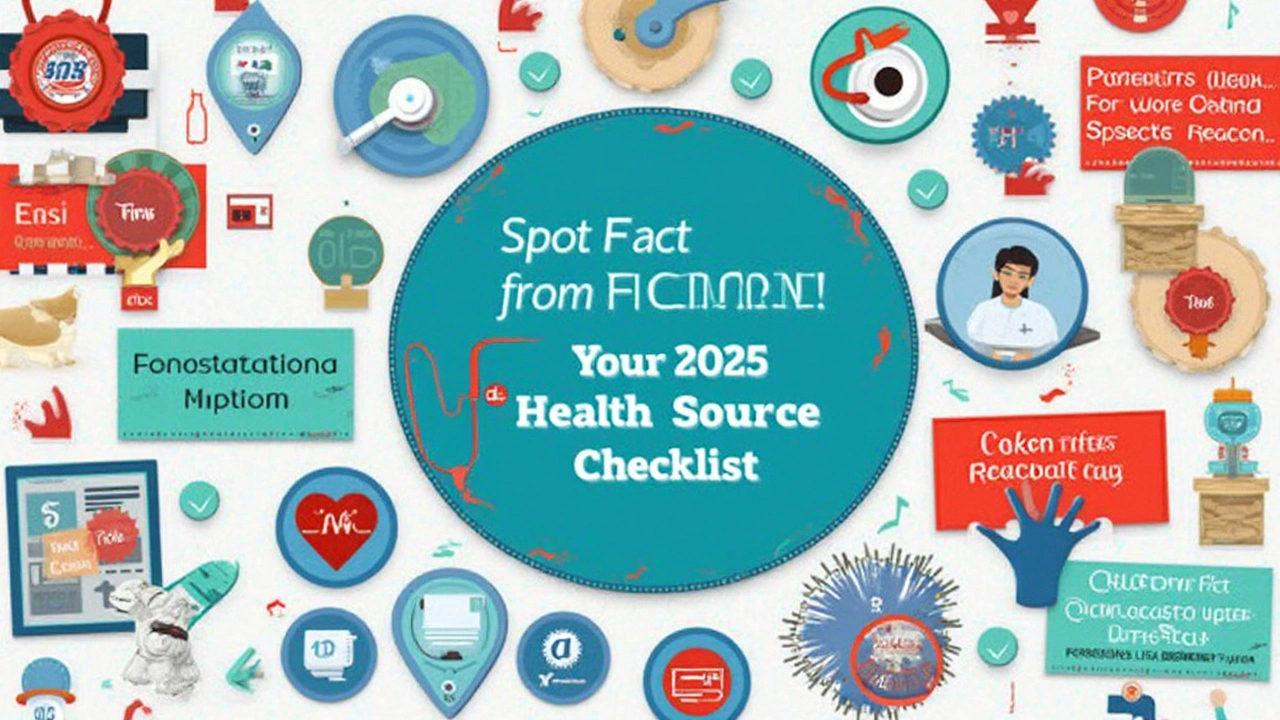
Misinformation moves at lightning speed. Just last month, a viral TikTok video convinced thousands to try a ‘detox’ that turned out to be downright dangerous. Everyone wants answers fast—but bad sources can do more harm than good. You’d think Google would help, but even the top results can slip risky or biased advice right into your feed. Studies out of Stanford in 2024 found that nearly half of adults can’t spot fake health content from the real stuff online. Yikes. With AI-written articles, social ‘experts,’ and endless pop-up ads, how do you find actual, trustworthy medical info? The answer: Stay sharp, question everything, and use the right checklist. Here’s how to get started before you Google your next symptom.
What Reliable Medical Websites Have in Common
Ever noticed how professional medical sites share certain habits? First, they back up claims with real science—not just a single ‘study’ that sounds impressive but means nothing. For example, sites like Mayo Clinic, Cleveland Clinic, and MedlinePlus link to current, peer-reviewed research for nearly every point. You’ll usually find references at the bottom of the page or within the article. That’s not just academic showboating; it’s transparency. If a site talks about a miracle cure but doesn’t show where the facts come from—big red flag.
Next up, check for author credentials. Would you take nutrition tips from someone with zero background in science? Reputable health sites list the author’s qualifications, degrees, or, better yet, show that MD, DO, RN, or professional medical association. Look for timestamps, too. Health advice changes fast (remember when butter was evil and now it’s not so bad?). Reliable sites review and date their content so you know if you’re looking at yesterday’s news or a decade-old myth.
Bias is another sneaky issue. If a site has endless ads for their own vitamin lines or pushes certain procedures over others, alarm bells should ring. Good sites separate editorial from advertising, and make any sponsorships clear. In 2025, tighter FTC guidelines require even influencers to label sponsored content. If you can’t tell the difference, that’s a sign to leave.
Another quick tip: look for ‘.gov’ or ‘.edu’ domains, which are far more regulated than ‘.com’ health sites. Government and academic institutions have stricter rules on what gets published. MedlinePlus, run by the National Library of Medicine, or CDC resources, are usually on the safe side. You won’t see miracle claims or clickbait headlines on those pages.
Here’s a table to help you compare websites before deciding who to trust:
| Feature | Trusted Medical Website | Unreliable Website |
|---|---|---|
| References scientific studies | Yes, links to reputable journals | No or links to questionable sources |
| Author credentials | MD, RN, or science qualifications clearly listed | Blogger or anonymous |
| Content review dates | Visible, often very recent | Missing or old |
| Advertising transparency | Separate, clearly labeled ads | Ads mixed with content |
| Domain type | .gov, .edu, or known non-profits | Random, unfamiliar .coms |
When you add up these traits, you get a simple, everyday checklist: check for original sources, scan for author expertise, look for a recent date, watch out for product pushing, and peek at the domain. Make it a routine, not just a once-in-a-while task. Misinformation rarely shouts—it whispers from shady sites aiming for your clicks, not your health.

Red Flags That Should Make You Click Away
So, you’re scrolling late at night looking for an answer, and you land on a website you’ve never seen before. Before you even read the headline, your scam sense should tingle at certain things. Any popups offering a ‘one simple trick’? Instant credibility drop. Websites peddling ‘secret remedies your doctor won’t tell you’ are classic signs of misinformation. Real health advice doesn’t hype up magical cures or scare you into buying something.
Look closely at the web design. It sounds shallow, but sites with endless scrolls of stock images, misspelled words, or clickbait ads—‘Doctors hate this guy!’—should make you hit the back button fast. Poor site design often means little quality control, and sometimes that’s exactly what scam sites want. Grammar mistakes, shifting fonts and colors, and weird layout choices rarely go hand-in-hand with good science.
Testimonials are another red flag. If an article leans heavily on personal stories—‘Janet from Boise lost 40 pounds in a week’—without solid medical reasoning behind the advice, don’t trust it. Real clinical evidence always trumps dramatic before-and-after photos.
About those miracle claims—did you know that in 2023, the FDA flagged more than 180 websites for advertising fake treatments? Chronic pain, weight loss, and sexual health are the most common targets. Whenever someone claims to ‘cure’ diabetes or arthritis, take a breath and research more. Chronic conditions don’t just vanish from a magic pill or herbal tea, no matter how many reviews are posted. Fact-check wild claims against reliable government sources or legitimate hospital systems. Mayo Clinic, Cleveland Clinic, and MedlinePlus are some of the best for fact-checking the basics.
Sometimes the deception is subtler. A flashy infographic doesn’t make bogus info more credible—it just spreads it faster. Watch out for heavy use of infographic posts with minimal references or data. If there’s no author listed, zero citations, and no date, it’s usually worth skipping altogether.
Worried you’re not techy enough for all this? Here’s a quick mental checklist every time you see a suspicious site:
- Promising ‘miracle’ results or ‘guaranteed cures’
- No listed author or source
- Poor spelling and grammar
- Heavy product promotion or ‘buy now’ pressure
- No links to real studies or only referencing their own products
- Anonymous or unverifiable testimonials
- Offers advice that goes against major medical organizations, without solid evidence
If you tick more than two boxes above, you’re probably safer looking elsewhere. Don’t risk your health on advice that’s only after your wallet.

The 2025 Checklist: Vetting Health Websites (and Where to Go Instead)
Checking medical websites isn’t just for tech nerds anymore. With AI tools writing content and even mimicking expert tone, it’s easy to get duped. But knowing what to look for puts you firmly in the driver’s seat. Here’s a checklist that works in 2025 and beyond:
- Source Transparency: Does the website clearly say where its information comes from? You should see links, citations, or references to studies published in recognized medical journals or from trusted organizations.
- Author & Reviewer Info: Look for an author’s qualifications and a medical reviewer, ideally with an MD or PhD. It’s even better if articles are reviewed by an advisory board rather than just one person.
- Date of Last Review: Good sites display the ‘last updated’ timestamp. Google even downgrades stale content in its search results these days—so if you can’t find a date, move on.
- Independence from Commercial Interests: Is the article trying to sell something or does it stick to the facts? WebMD, for example, has been criticized in the past for promoting branded drugs in editorial content—so even big names deserve second looks.
- Privacy Policy and Data Protection: Does the site protect your info? Steer clear of sites collecting personal details without a clear privacy policy. In 2025, HIPAA-compliance and GDPR-style privacy banners are a standard, not a bonus.
- Readability and Accessibility: Medical jargon shouldn’t be a barrier. Top sites keep things simple, use everyday words, and include summaries for fast reading.
- Affiliations and Endorsements: Reliable sites mention links to hospitals, universities, or government bodies. If the American Heart Association or National Institutes of Health shows up on their ‘partners’ page, you’re in safer territory.
Here’s another helpful trick: fact-check advice by searching for consensus among multiple reputable health sites. If Mayo Clinic, MedlinePlus, and Harvard Health say roughly the same thing about, say, GERD symptoms or treatment options, you can probably trust it. One weird outlier contradicting everyone else? That’s a sign to dig deeper—or click away.
If all this feels overwhelming, there are some curated lists of strong sites to help you get started. Instead of relying only on familiar-but-flawed WebMD, this reliable alternative to WebMD roundup provides a handpicked set of options that focus on transparency, credentials, and clear ties to respected institutions.
The landscape will keep changing. AI-generated articles, influencer-driven health tips, and deepfake videos make the truth harder to spot. But savvy web users are fighting back with tools like browser extensions that flag unreliable sites, browser plugins that reveal site ownership, and password managers that warn against phishing sites. Stick to your checklist, share it with family and friends (especially those not so tech-savvy), and think of every search result as a starting point—not the finish line.
Getting health info online is basically second nature now, and there’s no shame in hitting the search bar first. The trick is knowing how to separate truth from snake oil. Even the big names aren’t perfect, but with a sharp checklist, you’ll stay several steps ahead of the scammers and land on the best advice for your health—every single time.





Comments (11)
alan garcia petra
Man, I really appreciate this article dropping knowledge on how to sift through all that health info online. Sometimes I feel like I’m drowning in misinformation. Having a checklist for spotting legit websites is such a big deal. I mean, WebMD is great but not the only player, and trusting just one source feels risky.
The tips on fact-checking health info in 2025 are super helpful too, especially with fake news evolving so fast. I feel more confident already about where to click next time I look stuff up. Would love to see some examples of trusted alternatives to WebMD, because then I can bookmark them for real.
Also, how important do you guys think peer reviews or medical expert contributions are on these sites? I always wonder whether they actually check these articles thoroughly.
Tammie Sinnott
This is exactly the kind of guidance we all need when navigating health info online. It’s astounding how much bogus material is out there masquerading as credible advice. Honestly, I think a lot of people underestimate how dangerous misinformation can be.
Breaking down the red flags in detail really shines a light on the subtle tricks shady sites use to fool you. I admire the thoroughness in sharing up-to-date hacks for spotting fact from fiction. Technology and algorithms evolve so fast, and we need to keep pace.
What also rings true is the emphasis on never settling for one source. Diversity in research makes all the difference. This post is like a lifesaver in the ocean of health info chaos.
Richard Gerhart
Hey folks! This post nails something critical — knowing how to pick your sources is literally the first step to protecting your health online. One thing I’d add: always check the credentials of the site’s authors or editors. If they’re real medical pros or affiliated with recognized institutions, that info is gold.
Also, watch out for sites that push products or services aggressively; that’s a red flag right there. Real medical sites focus on education, not selling you stuff. And if a site links heavily to peer-reviewed studies, that boosts trust big time.
Happy to drop some trusted sites I use personally if anyone wants recommendations!
Nilesh Barandwal
Very well articulated article! The importance of vigilance cannot be overstated!!!! In this overwhelming digital age, everyone must be equipped with robust strategies to discern legitimate information from deception!!!
The checklist approach is indeed systematic and effective!!! I also believe repeated exposure to unreliable content profoundly skews public health choices!!! This piece rightly empowers readers to be cautious, critical, and curious!!!
Does anyone have personal experiences where a medical website misled them? Such anecdotes would enrich this discussion greatly!!!
jana caylor
Really enjoyed the detailed breakdown here. What stood out most to me was the part about spotting red flags. Like, how often do we just skim and trust the first website that pops up?
I think the article also could have mentioned the importance of cross-referencing symptoms or advice with multiple sources. That’s something I try to do, and it helps me avoid falling for weird or outdated info.
Also wondering – when the article lists alternatives to WebMD, are these sites internationally recognized? Because it’d be great if these options work well across different countries and healthcare systems.
Elise Smit
This article really highlights how crucial literacy in online health info has become. The pace of misinformation is alarming, so arming ourselves with a clear checklist is invaluable.
I've noticed that the best medical sites are not just accurate but transparent about their sources and update their info regularly. Static pages that don't show recent updates often signal outdated advice.
Curious if anyone’s found sites that actually do a great job of this transparent updating? I think it’s one of the strongest indicators of reliability.
Vijendra Malhotra
Well, as someone who deals a lot with technical content and grammar, I must say this post could improve in delivering clarity in phrasing. That said, the info on how to critically evaluate the medical sites is much needed.
Clarity and precision in language help build trust, especially in medical content. Websites that write in overly complicated or vague terms are suspect in my opinion. That’s one of the red flags I'd add.
Does anyone have thoughts on how important linguistic clarity is alongside factual accuracy when judging health websites?
Allan Jovero
Allow me to emphasize the paramount importance of impeccable grammar and stylistic precision when presenting medical information online. Inaccuracies and ambiguous syntax not only diminish credibility but also potentially mislead readers, which is utterly unacceptable in such a critical arena.
The author’s checklist would benefit significantly by integrating strict language standards as a criterion for assessing trustworthiness. The presence of glaring errors is undoubtedly a glaring warning sign.
I would be interested in knowing whether the recommended alternative sites conform rigorously to these linguistic standards.
Andy V
Just gotta jump in here and say that grammar isn’t just about looks; in health info, it can literally change meanings. Who here has encountered medical advice online that was so poorly written you had no clue what it meant? It's frustrating and dangerous.
That said, let’s not get hung up on minor slips, but major errors? Big no-no. I’m glad this article highlights red flags because if you see sloppiness, that’s a big warning to step back.
I’m curious—when sites defend themselves by saying 'content is reviewed,' do you take that at face value? Or is it just lip service?
Kim M
Ugh 😤 This post hits a sore spot. We're living in a world where pharma companies and shady gov agencies are pushing the wrong info to keep us confused. The fact that we need checklists to figure out what’s TRUE just proves how deep the conspiracy runs. 😡
The so-called 'trusted' medical sites? Most are probably in on the game, sugarcoating risks and hiding alternatives. Don’t fall for the fancy visuals and 'peer reviewed' buzzwords—they manipulate to control narratives.
If you ask me, the best defense is skepticism ALL THE TIME!!! And cross-check with independent researchers, not just popular sites.
joni darmawan
Really fascinating topic, and a reminder of how digital philosophy must evolve to include critical consumption of info. The post’s checklist reflects a broader need for epistemic humility in the digital age—recognizing our limitations in filtering knowledge.
It also challenges us to think deeply about the ethics of information dissemination in healthcare. Are we too quick to trust simply because a site looks professional? Or because it confirms biases?
I’d love to see more discussion on how cultural contexts influence the way we interpret medical info online.